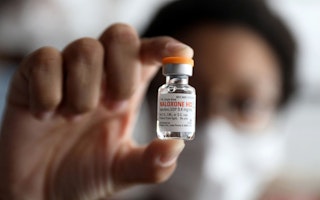The Myth of Self-Inflicted HIV Infection
By Daniel Wolfe
There are two stories about people who inject drugs—both urban legends with no base in reality—that I have heard in virtually every country I work in. The first is that people are injecting themselves with HIV to get government benefits. The second is that people who inject drugs are intentionally leaving or using needles to infect other people.
While neither is true, the fact that I hear them relayed so often, with such conviction, shows how much more comfortable it is for many of us to blame those who are most vulnerable than to help them cope.
The first claim—that people are intentionally infecting themselves with HIV—recently got a boost from an unlikely source that should know better: the World Health Organization. As noted in the New York Times, the WHO published a report recently with the shocking claim that half of infections among people who inject drugs in Greece—a country now experiencing a skyrocketing epidemic among heroin users—were the result of people intentionally infecting themselves to get government benefits.
When challenged, the authors backpedalled slightly, noting that only some of the infections were self-inflicted. This too, turned out to be baseless. Finally, the WHO retracted entirely. Conservative commentators, however, had already gone to town in the media and in the Twittersphere. Teaparty.net tweeted that half of all Greek HIV infections were self-inflicted. The Greek case, Rush Limbaugh said on his talkshow, revealed “what the welfare state does to people.”
The claim that drug users are systematically infecting other people is another story that turns the vulnerable into the irresponsible. In most countries, the story goes like this: Someone that someone knows sat in a movie theater and felt a little jab. When she or he looked down, there was a syringe with a note that said, “Congratulations, you have AIDS.” I have heard this in New York, in Kyiv, in St. Petersburg, and in Bangkok. And like the story about Greece, when pressed, it turns out to be a fantasy portrayed as fact.
Why is it so compelling to portray drug users who get HIV as the cause of their own or other’s infections?
Limbaugh, while peddling lies, apprehended a basic truth: this kind of stigmatizing is good for cutting benefits. Take a complex and intractable social problem (in this case, drug dependence or HIV infection), turn it into an individual failing (in this case, dangerous or reckless drug use), and so relieve government of responsibility to provide services such as clean needle programs or HIV treatment.
Such arguments get all the more common when the budget, as in the Greek case, gets tight: “These people don’t need our help! They brought it on themselves!”
Of course, what people who inject drugs could really use is harm reduction programs that help them to protect themselves, their families, and their communities. For proof that this works, we need look no further than Australia, France, or other countries where a combination of needle and syringe services, and prescription of methadone and buprenorphine have brought HIV transmission via injection down to zero.
Making this the global standard is not that hard. But it would require us to replace the old stories about drug user irresponsibility with a new narrative about how we—a “we” that includes drug users themselves—can work together to protect health and save lives.

Until December 2021, Daniel Wolfe was director of the International Harm Reduction Development Program at the Open Society Foundations.

